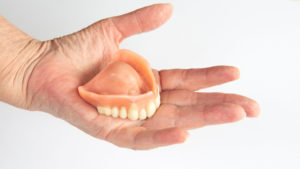
Can you imagine eating your favorite food or drinking your preferred beverage but not tasting it? The sense of taste is one of the most important senses and contributes greatly to the vibrancy of daily life. However, as you get older, you may find that wearing dentures impacts your ability to fully experience your meals. Keep reading to learn about the ways that dentures in Ocala can affect your sense of taste and what you can do about it.
We Lose Taste as We Age
First, it’s important to recognize that one’s sense of taste naturally diminishes with age. As you get older, you may notice that your favorite foods seem less flavorful than they did when you were younger. Certain flavors may be affected more than others. For some elderly people, salty and sugary foods still pack a flavorful punch, so they may incorporate more sweets and salty snacks into their diets.
When Do Dentures Affect Taste?
In addition to the natural effects of aging, dentures in Ocala can also negatively impact your sense of taste in certain circumstances.
Full Upper Dentures
The majority of taste buds are located on the tip of the tongue. However, you also have taste receptors in the cells of your cheeks, throat, and the roof of your mouth. Many full upper dentures utilize a base plate that covers the upper palate to remain securely in place. If your dentures cover the roof of your mouth in this way, you may experience some loss of taste. However, over time your brain may grow accustomed to wearing dentures and your taste may return to normal.
Poorly Fitting Dentures
If your dentures shift or don’t fit comfortably, you may have to use denture adhesive to keep them securely in place. Frequent use of denture adhesives can leave an unpleasant metallic taste in your mouth and alter taste sensation.
Food and Stain Buildup
Without proper care and cleaning, food deposits and stains will naturally build up on your dentures. These stains and food deposits can cause a bad taste in your mouth or interfere with your taste of foods.
Minimizing the Impact of Dentures on Taste
Here are three steps you should consider taking if you are concerned about dentures impacting your ability to taste food:
- Practice excellent oral hygiene – Brush your dentures daily and let them soak overnight to prevent food debris from building up and causing foul smells and tastes.
- Make sure your dentures fit – If you frequently have to rely denture adhesive, take your dentures to a dentist to adjust or reline them so that they’ll fit properly.
- Consider dental implants – Instead of relying on a base plate that covers taste receptors, dental implants support artificial teeth by integrating directly with the jawbone.
In the end, multiple factors can contribute to the loss of taste, including old age. If you wear dentures, talk to your dentist about how to best recover your ability to enjoy full flavors.
About the Author
Dr. Daniel Weldon is dedicated to providing superior dental care to individuals and families in Ocala. The University of Florida College of Dentistry graduate regularly provides high-quality dentures and recently became a master in the International Congress of Oral Implantologists. To learn more about dental implants and dentures in Ocala, visit the Weldon General & Cosmetic Dentistry website or call Dr. Weldon at 352-622-3236.

